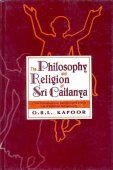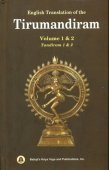Sanatana, Sanātana: 19 definitions
Introduction:
Sanatana means something in Hinduism, Sanskrit, Marathi, Hindi. If you want to know the exact meaning, history, etymology or English translation of this term then check out the descriptions on this page. Add your comment or reference to a book if you want to contribute to this summary article.
Alternative spellings of this word include Sanatan.
In Hinduism
Vaishnavism (Vaishava dharma)
Source: humindian: 108 names of Lord KrishnaOne of the 108 names of Krishna; Meaning: "The Eternal Lord"
Source: Pure Bhakti: Bhagavad-gita (4th edition)Sanātana (सनातन) refers to “eternal”. (cf. Glossary page from Śrīmad-Bhagavad-Gītā).

Vaishnava (वैष्णव, vaiṣṇava) or vaishnavism (vaiṣṇavism) represents a tradition of Hinduism worshipping Vishnu as the supreme Lord. Similar to the Shaktism and Shaivism traditions, Vaishnavism also developed as an individual movement, famous for its exposition of the dashavatara (‘ten avatars of Vishnu’).
Purana and Itihasa (epic history)
Source: archive.org: Puranic Encyclopedia1) Sanātana (सनातन).—A hermit. It is mentioned in Mahābhārata, Sabhā Parva, Chapter 4, Stanza 16, that this hermit shone in the court of Yudhiṣṭhira.
2) Sanātana (सनातन).—One of the Sanakādis.
Source: archive.org: Shiva Purana - English Translation1) Sanātana (सनातन) or Bhṛṅgiriṭi is the name of a leader of Gaṇas (Gaṇapa or Gaṇeśvara or Gaṇādhipa) who came to Kailāsa, according to the Śivapurāṇa 2.1.20. Accordingly, after Śiva decided to become the friend of Kubera:—“[...] The leaders of Gaṇas revered by the whole world and of high fortune arrived there. [...] Lokāntaka, Dīptātmā and the lord Daityāntaka, lord Bhṛṅgīriṭi and the glorious Devadevapriya, Aśani, Bhānuka and Sanātana each with sixty-four crores; Nandīśvara the supreme chief of Gaṇas, and Mahābala each with hundred crores. [...]”.
These [viz., Sanātana] and other leaders of Gaṇas [viz., Gaṇapas] were all powerful (mahābala) and innumerable (asaṃkhyāta). [...] The Gaṇa chiefs and other noble souls of spotless splendour eagerly reached there desirous of seeing Śiva. Reaching the spot they saw Śiva, bowed to and eulogised him.
2) Sanātana (सनातन) refers to “imperishable” (the eternal principle), according to the Śivapurāṇa 2.2.16. Accordingly as Brahmā narrated to Nārada:—“[...] On hearing these words of mine—of Brahmā—in the presence of Viṣṇu, Śiva, the lord of worlds spoke to me with his face beaming with a smile: [...] Sometimes I will be thinking about Śiva, my own form of splendour, the eternal principle which the scholars well versed in the Vedas call Imperishable (sanātana). When I go in trance, O Brahmā, in that meditation, damned be she who causes an impediment therein”.
3) Sanātana (सनातन) refers to the “eternal” and is used to describe Śiva, according to the Śivapurāṇa 2.2.42.—Accordingly, as Dakṣa bowed and eulogised Śiva:—“I bow to the great lord, the supreme being, the bestower of boons, the store of knowledge, the eternal (i.e., Sanātana). I bow to Śiva, the lord of the chief of Gods, always conferring happiness and the sole kinsman of the universe. I bow to the lord of the universe, of cosmic form, the primordial Being and the form of Brahman itself. I bow to Śiva, the conceiver of world’s happiness and the greater than the greatest. [...]”.
Source: Cologne Digital Sanskrit Dictionaries: The Purana Index1a) Sanātana (सनातन).—A mind-born son of Brahmā;1 a son of Kaṅka, an avatār of Śiva; got mokṣa by jñānam;2 a Brahmaṛṣi.3
- 1) Bhāgavata-purāṇa III. 12. 4; Vāyu-purāṇa 9. 72; 101. 337.
- 2) Ib. 23. 131; 24. 79; 61. 155 and 161.
- 3) Matsya-purāṇa 102. 17.
1b) An epithet of Viṣṇu.*
- * Matsya-purāṇa 248. 37.

The Purana (पुराण, purāṇas) refers to Sanskrit literature preserving ancient India’s vast cultural history, including historical legends, religious ceremonies, various arts and sciences. The eighteen mahapuranas total over 400,000 shlokas (metrical couplets) and date to at least several centuries BCE.
Yoga (school of philosophy)
Source: Wisdom Library: YogaSanātana or Satātana is one of the eighty-four Siddhas associated with eighty-four Yogic postures (āsanas), according to popular tradition in Jodhpur, Rājasthān. These posture-performing Siddhas are drawn from illustrative sources known as the Nava-nātha-caurāsī-siddha from Vȧrāṇasī and the Nava-nātha-caruāsī-siddha-bālāsundarī-yogamāyā from Puṇe. They bear some similarity between the eighty-four Siddhas painted on the walls of the sanctum of the temple in Mahāmandir.
The names of these Siddhas (e.g., Sanātana) to 19th-century inscription on a painting from Jodhpur, which is labelled as “Maharaja Mansing and eighty-four Yogis”. The association of Siddhas with yogis reveals the tradition of seeing Matsyendra and his disciple Gorakṣa as the founders of haṭhayoga.
Source: ORA: Amanaska (king of all yogas): A Critical Edition and Annotated Translation by Jason BirchSanātana (सनातन) refers to “eternal”, according to the Viṣṇudharma verse 96.1 and 4.—Accordingly, “O Brahmin, you mentioned that this Brahma is eternal (sanātana) and from it this whole world [consisting of] moving and unmoving [things] arose [...]. Therefore, how could the [ever-changing] world arise from the eternal and omnipresent [Brahma], which is free from transformation and even devoid of quality?”.

Yoga is originally considered a branch of Hindu philosophy (astika), but both ancient and modern Yoga combine the physical, mental and spiritual. Yoga teaches various physical techniques also known as āsanas (postures), used for various purposes (eg., meditation, contemplation, relaxation).
General definition (in Hinduism)
Source: Wisdom Library: HinduismSanātana (सनातन) is a Sanskrit word referring to eternal, having no beginning or end.
Languages of India and abroad
Marathi-English dictionary
Source: DDSA: The Molesworth Marathi and English Dictionarysanātana (सनातन).—a S Eternal, perpetual, everlasting; that has ever been, or that will ever be.
Source: DDSA: The Aryabhusan school dictionary, Marathi-Englishsanātana (सनातन).—a Eternal, perpetual.
Marathi is an Indo-European language having over 70 million native speakers people in (predominantly) Maharashtra India. Marathi, like many other Indo-Aryan languages, evolved from early forms of Prakrit, which itself is a subset of Sanskrit, one of the most ancient languages of the world.
Sanskrit dictionary
Source: DDSA: The practical Sanskrit-English dictionarySanātana (सनातन).—a. (-nī f.)
1) Perpetual, constant, eternal, permanent; ज्वलन्मणिव्योमसदां सनातनम् (jvalanmaṇivyomasadāṃ sanātanam) Kirātārjunīya 8.1; एष धर्मः सनातनः (eṣa dharmaḥ sanātanaḥ).
2) Firm, fixed, settled; एष धर्मः सनातनः (eṣa dharmaḥ sanātanaḥ) Uttararāmacarita 5. 22.
3) Primeval, ancient.
-taḥ 1 The primeval being, Viṣṇu; सनातनः पितरमुपागमत् स्वयम् (sanātanaḥ pitaramupāgamat svayam) Bhaṭṭikāvya 1.1.
2) Name of Śiva.
3) Of Brahman.
4) A guest of the Manes.
5) Name of one of the sons of Brahman.
6) An ancient sage; द्विजाति- चरितो धर्मः शास्त्रे दृष्टः सनातनैः (dvijāti- carito dharmaḥ śāstre dṛṣṭaḥ sanātanaiḥ) Rām.2.61.23.
-nī 1 Name of Lakṣmī.
2) Of Durgā or Pārvatī.
3) Of Sarasvatī.
Source: Cologne Digital Sanskrit Dictionaries: Shabda-Sagara Sanskrit-English DictionarySanātana (सनातन).—mfn.
(-naḥ-nī-naṃ) 1. Eternal, continual, perpetual. 2. Firm, fixed, permanent. 3. Primeval. m.
(-naḥ) 1. Vishnu. 2. Siva. 3. Brahma. 4. A guest of the Manes, or one who is to be fed whenever he chooses to attend the obsequial ceremonies or Shraddhas. f. (-nī) 1. The goddess Lakshmi. 2. A name of Durga. 3. Saraswati. E. sanā always, and dyu or dyut aff.; or sadā ṭhyul tuṭ ca ni0 dasya naḥ .
Source: Cologne Digital Sanskrit Dictionaries: Benfey Sanskrit-English DictionarySanātana (सनातन).—[sanā + tana], I. adj., f. nī. 1. Perpetual, eternal, [Mānavadharmaśāstra] 1. 7; [Pañcatantra] ii. [distich] 112. 2. Firm, permanent. 3. Primeval, [Mānavadharmaśāstra] 1, 22 (ordained from the beginning); 3, 284. Ii. m. Viṣṇu, [Bhaṭṭikāvya, (ed. Calc.)] 1, 1; Śiva, Brahman. Iii. f. nī, Lakṣmī, Durgā, Sarasvatī.
— Cf. [Gothic.] sinteins, sinteino.
Source: Cologne Digital Sanskrit Dictionaries: Cappeller Sanskrit-English DictionarySanātana (सनातन).—[feminine] ī eternal, everlasting; [masculine] [Name] of a Ṛṣi etc.
Source: Cologne Digital Sanskrit Dictionaries: Monier-Williams Sanskrit-English Dictionary1) Sanātana (सनातन):—[from sana] mf(ī, m.[case] also ā)n. eternal, perpetual, permanent, everlasting, primeval, ancient, [Śatapatha-brāhmaṇa] etc. etc.
2) [v.s. ...] m. Name of Brahmā, [cf. Lexicographers, esp. such as amarasiṃha, halāyudha, hemacandra, etc.]
3) [v.s. ...] of Viṣṇu, [Bhaṭṭi-kāvya]
4) [v.s. ...] of Śiva, [cf. Lexicographers, esp. such as amarasiṃha, halāyudha, hemacandra, etc.]
5) [v.s. ...] a guest of deceased ancestors, one who must always be fed whenever he attends Śrāddhas, [cf. Lexicographers, esp. such as amarasiṃha, halāyudha, hemacandra, etc.]
6) [v.s. ...] Name of a Ṛṣi (in, [Mahābhārata] and later ‘a mind-born son of Brahmā’), [Taittirīya-saṃhitā] etc. etc.
7) [v.s. ...] of a king, [Buddhist literature]
8) [v.s. ...] (with śarman and go-svāmin) of two authors, [Catalogue(s)]
9) [v.s. ...] m. [plural] Name of [particular] worlds, [Harivaṃśa]
Source: Cologne Digital Sanskrit Dictionaries: Yates Sanskrit-English DictionarySanātana (सनातन):—[(naḥ-nī-naṃ) a.] Eternal, fixed; either god in the Hindu triad; a guest of the manes. f. (ī) Durgā; Lakshmī, Saraswatī.
[Sanskrit to German]
Sanskrit, also spelled संस्कृतम् (saṃskṛtam), is an ancient language of India commonly seen as the grandmother of the Indo-European language family (even English!). Closely allied with Prakrit and Pali, Sanskrit is more exhaustive in both grammar and terms and has the most extensive collection of literature in the world, greatly surpassing its sister-languages Greek and Latin.
Hindi dictionary
Source: DDSA: A practical Hindi-English dictionarySanātana (सनातन) [Also spelled sanatan]:—(a) eternal; ancient; orthodox; time-honoured; —[dharma] the orthodox Hindu religion; —[puruṣa] the Eternal Lord—Vishnu; [sanātanī] a follower of the —[dharma] ancient, traditional, orthodox, conservative; time-honoured.
...
Kannada-English dictionary
Source: Alar: Kannada-English corpusSanātana (ಸನಾತನ):—
1) [adjective] eternal; perpetual; permanent; everlasting.
2) [adjective] of or belonging to, existing from time immemorial.
--- OR ---
Sanātana (ಸನಾತನ):—
1) [noun] that which is eternal, everlasting.
2) [noun] that which has come from, existing from time immemorial.
3) [noun] the Supreme Being, who is ever existing and eternal.
Kannada is a Dravidian language (as opposed to the Indo-European language family) mainly spoken in the southwestern region of India.
See also (Relevant definitions)
Starts with: Sanatana gosvamin, Sanatana sharman, Sanatana tarkacarya, Sanatanadharma, Sanatanadharmi, Sanatanagosvami, Sanatanam, Sanatanasharman, Sanatanasiddhanta, Sanatanatama, Sanatanayoga.
Ends with: Rupasanatana.
Full-text (+118): Catuhsana, Haribhaktivilasa, Sanatna, Sanatanasiddhanta, Anishcintya, Sanatanatama, Purakalpa, Ujjvalarasakana, Bhaktisamdarbha, Bhaktibindu, Utpatsu, Sanatana tarkacarya, Kumara, Sanatra, Sanatana sharman, Karmavidhi, Sanatana gosvamin, Shailabha, Sanathan, Yogashatakavyakhyana.
Relevant text
Search found 81 books and stories containing Sanatana, Sanātana; (plurals include: Sanatanas, Sanātanas). You can also click to the full overview containing English textual excerpts. Below are direct links for the most relevant articles:
Shrimad Bhagavad-gita (by Narayana Gosvami)
Verse 11.18 < [Chapter 11 - Viśvarūpa-darśana-yoga (beholding the Lord’s Universal Form)]
Verse 7.10 < [Chapter 7 - Vijñāna-Yoga (Yoga through Realization of Transcendental Knowledge)]
Verse 4.30 < [Chapter 4 - Jñāna-Yoga (Yoga through Transcendental Knowledge)]
Brihad Bhagavatamrita (commentary) (by Śrī Śrīmad Bhaktivedānta Nārāyana Gosvāmī Mahārāja)
Verse 2.3.104-106 < [Chapter 3 - Bhajana (loving service)]
Verse 2.2.76 < [Chapter 2 - Jñāna (knowledge)]
Verse 1.3.44 < [Chapter 3 - Prapañcātīta (beyond the Material Plane)]
Amarakoshodghatana of Kshirasvamin (study) (by A. Yamuna Devi)
Introduction (Kṣīrasvāmin’s knowledge of grammar) < [Chapter 6 - Grammatical Aspects]
Bhajana-Rahasya (by Srila Bhaktivinoda Thakura Mahasaya)
Text 10 < [Chapter 4 - Caturtha-yāma-sādhana (Madhyāhna-kālīya-bhajana–ruci-bhajana)]
Text 24 < [Chapter 6 - Ṣaṣṭha-yāma-sādhana (Sāyaṃ-kālīya-bhajana–bhāva)]
Text 4 < [Chapter 8 - Aṣṭama-yāma-sādhana (Rātri-līlā–prema-bhajana sambhoga)]
Bhakti-rasamrta-sindhu (by Śrīla Rūpa Gosvāmī)
Verse 3.1.1 < [Part 1 - Neutral Love of God (śānta-rasa)]
Verse 2.1.295 < [Part 1 - Ecstatic Excitants (vibhāva)]
Verse 2.1.293 < [Part 1 - Ecstatic Excitants (vibhāva)]
Śrī Kṛṣṇa-vijaya (by Śrī Gunaraja Khan)
Related products





